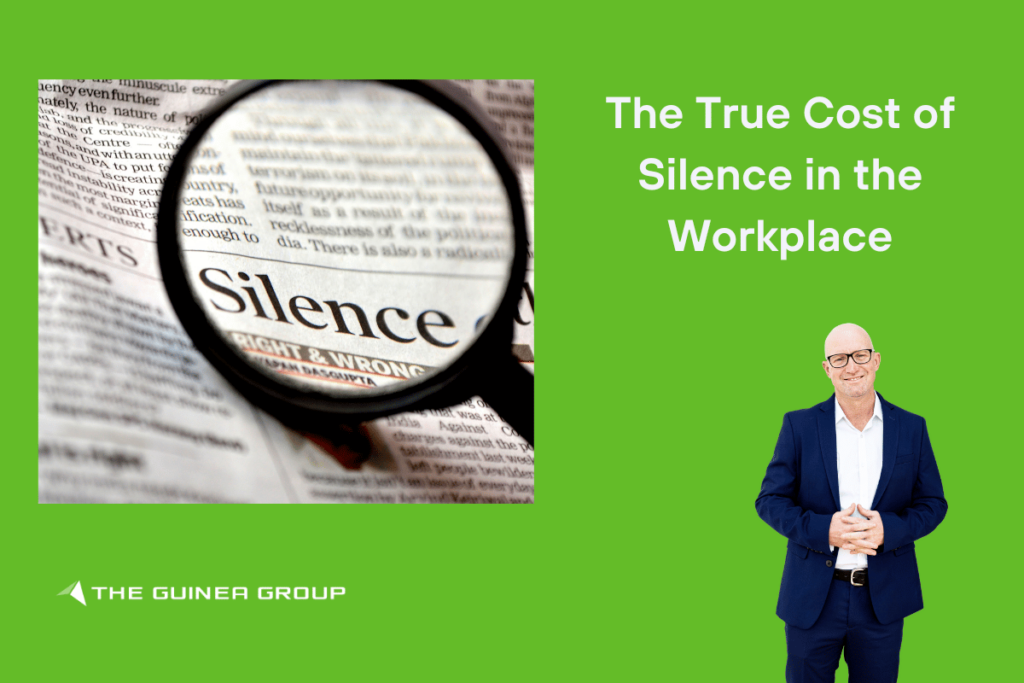Anton Guinea
Entrepreneur, Speaker, bestselling author, and founder of The Guinea Group of Companies. For over 15 years, Anton has helped leaders move their teams to become psychologically safe, physically safe and overall better versions of themselves.

The True Cost of Silence in the Workplace

What happens to a team when people stop speaking up and just start nodding along?
I’ve seen it too many times to count. Silence isn’t neutral. It’s not calm. It’s a signal. And more often than not, it’s a red flag waving right in front of us. But leaders miss it because it doesn’t make noise.
In fact, silence often looks like compliance. Until it isn’t.
Why silence costs more than mistakes
Let me say this upfront: most teams don’t fail because someone spoke up at the wrong time. They fail because no one spoke up at all.
Whether it’s about a safety concern, an ethical issue, or just a poor process that everyone’s too scared to question—silence gets expensive fast. There’s a great read here on how the real risk to businesses isn’t noise, but the vacuum left when people stop talking.
And I’ve seen it firsthand. The near misses that were never reported. The team member who didn’t feel safe raising a concern. The leader who thought their team was fine because “no one’s said anything”.
Fear looks quiet
One thing I always say in sessions is this: fear doesn’t look like fear. It looks like agreement. It looks like smiling and nodding. It looks like silence in the meeting and a text after saying, “Hey, I didn’t want to say it in front of everyone, but…”
If that sounds familiar, you’re not alone. I used to think I was encouraging feedback—until I realised I was only hearing from the most confident voices. That’s not culture. That’s bias in disguise.
Building a psychologically safe team means going out of your way to create space for those who don’t always speak first.
The silence you hear is culture speaking
I once said in a workshop that the loudest voice in a toxic workplace is silence. That got a few nods, but more than that, it sparked reflection. One leader said it reminded them of their last role where no one pushed back, not because they agreed, but because they’d given up trying.
If your people aren’t speaking up, ask yourself: what do they think happens when they do?
I’ve covered this topic in our piece on the scared to speak up quandary, but the short version? Silence is usually learned. People get burned once or twice for telling the truth, and they stop trying.
It’s not just bad for morale, it’s bad for business
There’s evidence from gallup that shows how much performance improves when people feel like their voice matters. And yet, many workplaces are still stuck in a cycle of “shut up and do your job”—sometimes explicitly, more often subtly.
We think silence keeps things tidy. It doesn’t. It buries issues until they explode.
I talk more about this in our breakdown on breaking the stress cycle—how unspoken tension compounds over time, becoming a psychological safety issue, a communication issue, and eventually a performance issue.
The stories I hear too often
Someone once told me: “It’s not that I’m afraid of speaking up. I’m just afraid of what happens next.” That stuck with me.
In those words, you hear the weight of every ignored suggestion, every punished truth-teller, every whispered conversation that never made it to the meeting room.
And I get it. I’ve worked in environments where the risk of speaking was higher than the risk of silence. But that doesn’t mean we can’t do better.
Changing the silence story
So how do we change it? It starts with deliberate signals of safety. Not grand gestures, small habits:
- Ask for opinions last, not first
- Reward courage, not just correctness
- Follow up on suggestions. Show people their voice led to action
- Apologise if you get it wrong—that one’s huge
And if you’re serious about shifting the culture? That’s what our speak safe training program was created for. It’s where we break down the cost of silence and build a communication culture that actually supports performance.
Silence is not a strategy
I want to make this clear: silence is a signal. You can ignore it. Or you can listen to what it’s really saying.
If you want to know what your people aren’t telling you, create the conditions where they’ll want to. That’s what leaders are here to do.
If this hit close to home, get in touch. Or if you’re ready to go deeper, you can book a team session with me.
Because silence may feel safer short-term. But speaking up is what actually gets us somewhere.
Please click the image below if you’d like to chat about what leadership means to you

If you would like to learn more about Anton or The Guinea Group, please click here to book into Anton’s calendar, to:
UPGRADE your Mindset
UPSKILL your Leadership
UPLIFT your Teams
About Anton
Anton has dedicated his working life to helping leaders to upgrade their mindset, upskill their leadership, and uplift their teams! With a focus on helps leaders to better lead under pressure. Anton is an entrepreneur, speaker, consultant, bestselling author and founder of The Guinea Group. Over the past 19 years, Anton has worked with over 175+ global organisations, he has inspired workplace leadership, safety, and cultural change. He’s achieved this by combining his corporate expertise, education (Bachelor of HR and Psychology), and infectious energy levels.
Work With Anton!
Subscribe to our Newsletter